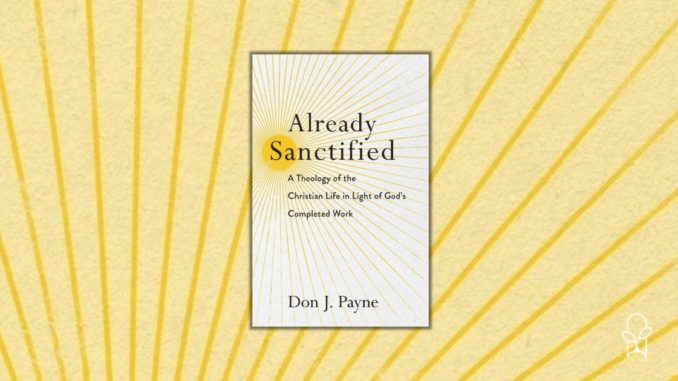
Published by Baker Academic on June 2020
Genres: Academic, Non-Fiction, Theology
Buy on Amazon
Goodreads

How does the doctrine of sanctification shape the Christian life? Offering a fully developed treatment of "accomplished" sanctification, Don Payne explains that the primary biblical focus in sanctification is not progressive growth but that which has already occurred for Christians to make growth possible, necessary, and grace-driven. As Payne explores the significance Scripture attributes to the accomplished aspect of sanctification, he helps us understand that we are already sanctified. Sanctification is not synonymous with transformation but undergirds strategies and resources related to Christian discipleship and formation.
Sanctification can sometimes be reduced in popular theology to discipleship. Justification is God’s work—we are saved by grace through faith—but sanctification is sometimes perceived as “our part” of salvation. Theologian Don J. Payne tackles that assumption in Already Sanctified: A Theology of the Christian Life in Light of God’s Completed Work with the thesis that sanctification is more about what has already occurred through the Spirit than what is progressively accomplished in the life of the believer. This focus on the “accomplished aspect” of sanctification is relatively ignored in the literature and this volume represents a course correction to that mistake.
Payne’s work is academic—it is from an academic publisher, after all—but don’t let that scare you. Already Sanctified is well-structured and reasoned and though Payne does assume his readers have some background in theology, he is clear and careful with his explanations. The book begins with an overview of how sanctification is commonly described, which Payne then contrasts with several biblical texts that challenge those assumptions. In fact, Payne does not believe that “progressive sanctification” is a good term for what we commonly perceive to be sanctification, instead preferring to completely separate sanctification from increasing spiritual maturity.
Payne spends a chapter on sanctification in the Old Testament and two chapters in New Testament to make this point, arguing for it fairly convincingly. His three main conclusions are:
- When Scripture speaks of sanctification, it speaks of it in terms of an already-completed work.
- When Scripture commands future sanctity or holiness, it does so only within the context of accomplished sanctity.
- Sanctification is not just declarative or positional, but relational.
That second conclusion is his weakest, as it makes the assumption that sanctification can only be one thing, but it’s still a case he makes well. There’re also some points where Payne’s exegesis can be a bit assumptive, or simply where there are compelling contradictory arguments to be made. Whatever the case, Payne does provide a robust, alternate perspective of sanctification that’s been missing from Protestant theology.
My concern, however, is that it does just come down to semantics. Protestant theology has always over-relied on positional salvation and ultimate judgment/reward and been weak on discipleship/transformation/sanctification. You can see this most clearly in the rise of pre-tribulational eschatology or in various elements of the “culture wars” or in appeals to a future eternal state that reduce salvation to an already-completed and yet still future event. Much of what Payne writes about isn’t all that controversial within Protestantism, it is just generally covered under different terms. My fear would be that, by emphasizing this element of sanctification, we might accidentally downplay the need for spiritual growth and transformation—whatever term we use for it. Payne seems to believe that correctly parsing the precise definition of sanctification is the key to helping believers understand the difference between what God has done and what God is doing through them, and I just don’t think it’s the lynchpin argument he’s making it. Payne makes good arguments, but they aren’t grounded in practicalities that enable implementation. It’s a good academic argument and worth the conversation, but a lot more will need to be done to bring into a conversation with popular theology.
